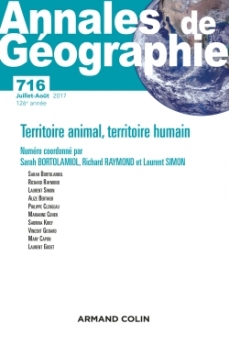
Annales de géographie n° 716 (4/2017)
Pour acheter ce numéro, contactez-nous
Recevez les numéros de l'année en cours et accédez à l'intégralité des articles en ligne.
Dans un contexte de développement du commerce international des nouveaux animaux de compagnie, les villes constituent des points d’entrée privilégiés pour les introductions d’animaux exotiques. Si beaucoup de travaux démontrent les impacts négatifs de ces introductions, peu se focalisent sur l’appréciation de ces espèces par les habitants des territoires d’accueil. L’arrivée de la Perruche à collier (Psittacula krameri) dans la métropole parisienne offre la possibilité d’étudier les perceptions et appréciations par les citadins d’une espèce invasive potentielle qui suscite a priori leur sympathie. Nous avons interrogé les critères déterminant ces perceptions et appréciations. Alors que cet oiseau est spontanément apprécié pour son exotisme, un retournement de valeur s’opère à mesure que sa population augmente et qu’il devient commun. Le statut de l’espace où l’habitant interagit avec la Perruche influence également son appréciation, les nuisances étant moins tolérées à proximité des espaces privés.
With the development of worldwide trade of exotic pets, cities have become key entry points for the increasing introductions of non-native animals. While many studies show the negative impacts of these introductions, few focus on the appreciation of these species by the city-dwellers. With the arrival of the Rose-ringed parakeet (Psittacula krameri) in the metropolis of Paris, we studied the inhabitants’ perceptions and appreciations of a potential invasive species, which at first sight arouses sympathy. The Authors investigated the criteria determining people’s perceptions and appreciations of this animal. Whereas this bird is liked spontaneously for its exoticism, an attitude reversal occurs with its population growth and as it becomes more commonplace. The status regarding the use of the place where inhabitants interact with the parakeet also affects how much it is appreciated, in that negative impacts are less tolerated when they are close to private spaces.